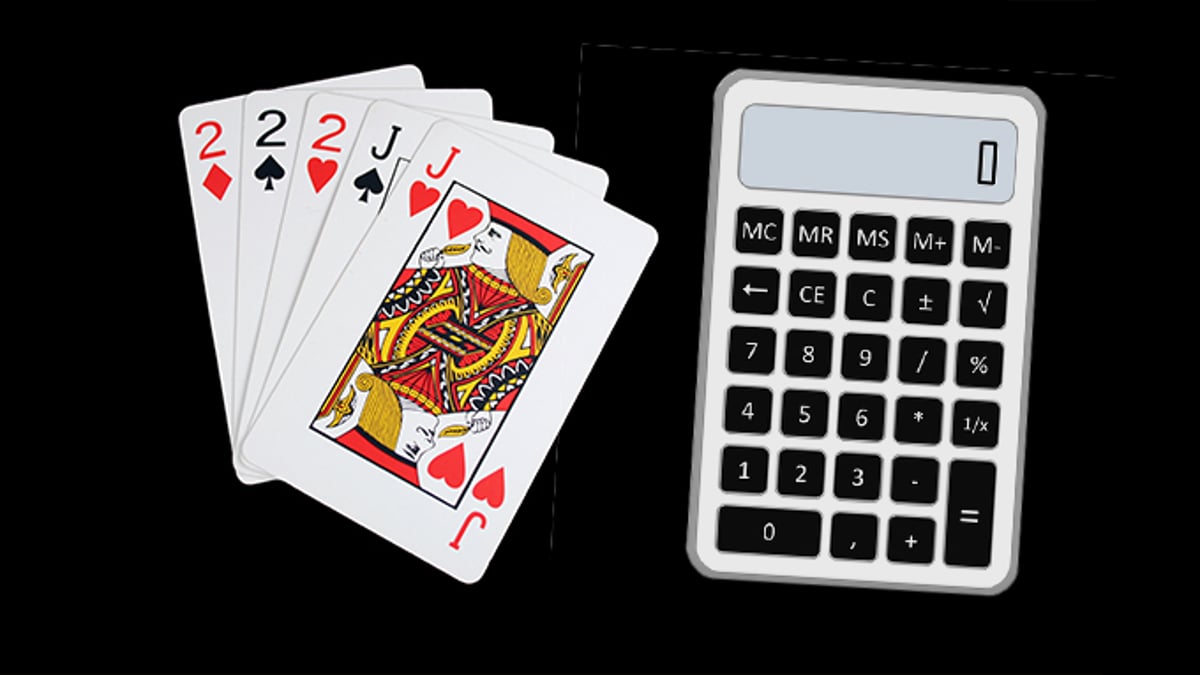Advanced Poker Strategy: Calculating Implied Odds

Poker, when it comes down to it, is really a game of mathematics. Being able to calculate implied odds is an incredibly useful skill that can help players make the right decisions on the spot and potentially maximise their winnings.
Implied odds are essentially the comparison between what you think you will win and the cost of a current bet. Players may be aware of the concept of implied odds and the relationship between the chance of making a winning hand and how much money is in the pot, but do not always put it into practice when playing. This strategy guide aims to give you some tips on how to work this into your game.
Implied Odds Explained
As opposed to pot odds, which only consider the money that's currently in the pot, implied odds also take into account any additional money that could come into the pot on future wagering rounds. They're called implied odds because they imply the betting of later rounds; they're an estimation of your opponents' future behaviour and how much more you could squeeze out of them. As the pot gets bigger, your implied odds go up.
Calculating Implied Odds
Let’s say you're facing a pre-flop raise of £10. The raiser has £300, which you believe you can win if you make your hand. This means that you're paying £10 for a potential £300 win, which gives you implied odds of 300/10 or 30/1. In other words, implied odds are the ratio of what you could potentially win to what you're betting.
To put it another way, imagine you have £5,000 and your opponent has £5,000. There is also £5,000 in the pot when the turn arrives. Your opponent bets £2,500, adding another £2,500 to the pot and leaving him with £2,500. If you call £2,500, your pot odds are 7500/2500, or 3/1. However, if you take into account the £2,500 that your opponent has remaining, you have implied odds of 10000/2500, or 4/1.
How and When to Use Implied Odds
Calculating pot odds is easy – you just compare what's in the pot with what you're staking. But because you're not taking into account what you could win on future rounds, pot odds can lead players to be cautious and underestimate their potential profit. Implied odds, on the other hand, are only an estimation of your opponents' future behaviour, so there is a danger of being too optimistic and making decisions based on unlikely events.
The usual rule in poker is that if the pot odds exceed the odds of making your hand, it's worthwhile to keep playing. Or to put it more generally, when the prize exceeds the cost of the game, you should keep playing. When the cost to play is more than the money you stand to win, it is better to fold. Implied odds can alter this decision, as although the current size of the pot might not justify playing on, the pot may grow sufficiently in future rounds to make it worth your while.
Implied odds are more useful in some situations than others, though, and the strategy depends very much on your hand and the playing style of your opponents. The more hidden your hand, the better the implied odds. If your hand is hidden, your opponent is not going to suspect that you have a strong hand, and you're more likely to get paid off on future rounds. If it's obvious that you have a big hand, you're unlikely to get much money from the other players at the table.
Check Out: Leo Vegas Sports for latest odds, free bets and welcome bonus.
What to Look Out For
Straights and sets have good implied odds because they're not as easy to spot, whereas flushes have poor implied odds because many players will become wary when three or more cards of the same suit appear on the table.
You also need to be aware of what type of players you're up against. If you have opponents who are so-called 'calling stations' (those who call but never raise) or 'maniacs' (those who play anything), then implied odds are helpful as you have no clue what hand they've got. With opponents who are tight or solid, it may be better to hold off. Use their previous behaviour to help you predict their future actions.
Take a break from scrolling and try your hand at online poker for a chance to win big and have fun.
Stay In The Loop With New Casino Sites & Offers!
Free Spins. Exclusive Bonuses. Sent Weekly.








